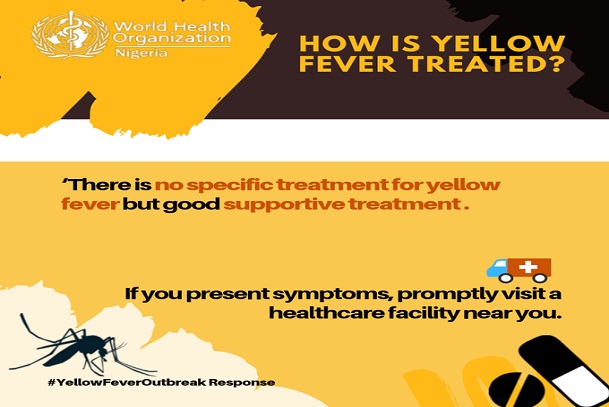 Wash your hands regularly and wear a face mask.
Learn more
Wash your hands regularly and wear a face mask.
Learn more

Management and Treatment of Yellow Fever
Presently, there is no specific antiviral for treating yellow fever. However, the illness can become quite severe, and related complications can require medical care, where good and early supportive treatment can help to improve survival rates i.e., patients should take appropriate rest, stay hydrated and seek medical treatment. This is one reason why preventive measure such as vaccination is very important.
People with severe symptoms of yellow fever infection should be hospitalized for close observation and supportive care. Supportive treatment is usually aimed at controlling the symptoms, enough rest, fluids, and use of medicines to help relieve fever and aching. Certain medications should be avoided, such as aspirin or nonsteroidal anti-inflammatory drugs (NSAIDs), which may increase the risk of bleeding.
Since there is no effective treatment or vaccine, prevention is critical. This is best accomplished by avoiding mosquito bites entirely. Even very short periods outdoors can lead to exposure to mosquito bites, so people should wear proper protective clothing. This protection includes long sleeves, long pants, socks, and closed-toe shoes. Pant legs can be tucked into socks to prevent bites to exposed ankles. Children’s wading pools should be emptied and stored on their sides, and tire swings should have holes drilled into the bottom to allow trapped water to drain.
Mosquitoes Avoidance
The avoidance of mosquito bites (use of insect repellant, wearing proper clothing, etc.) is among the most important measures to prevent infection with yellow fever. People with yellow fever should be protected from further mosquito exposure (for example, they should stay indoors or under a mosquito net) during the first days of illness, so as not to contribute to the disease transmission cycle by infecting uninfected mosquitoes that can spread the virus to other people. Dress children in clothing that covers arms and legs. Cover strollers and baby carriers with mosquito netting.
Transmission is common during the warmer months, and mosquitoes may bite through very thin clothing, so treating clothing with repellents containing permethrin, DEET, oil of lemon eucalyptus, or other EPA-registered insect repellants will reduce this risk. Permethrin should not be applied directly to the skin, but when applied to clothing, it provides protection even after the clothing is washed. Transmission is most frequent when mosquitoes feed, between dawn and dusk, so outdoor activities during this period should be avoided. However, one of the mosquitos responsible for transmitting the virus, Aedes, feeds during the daytime; so, there is no safe time during the day for a traveler without repellent and wearing protective clothing.
Travelers should sleep in air-conditioned spaces or use mosquito nets or screens to prevent bites during sleep. Standing water is a breeding ground for mosquitoes, so flower pots, buckets, and other containers should be drained.
It is believed that people who have had yellow fever do develop lifelong immunity.
Yellow Fever Vaccination
An effective vaccine also exists to prevent yellow fever. Yellow fever vaccine is a live-virus vaccine, and a single dose protects against disease for 10 years or more. If a person is at continued risk of infection, a booster dose is recommended every 10 years.
Yellow fever vaccine is recommended for persons aged 9 months or older who are traveling to (or living in) areas at risk for yellow fever virus transmission in South America and Africa. Some countries require individuals entering their borders to display a valid International Certificate of Vaccination or Prophylaxis, documenting their receipt of the yellow fever vaccine.
Serious adverse events can occur following yellow fever vaccination. Therefore, persons should only be vaccinated if they are at risk of exposure to the yellow fever virus or require proof of vaccination for country entry. Individuals considering yellow fever vaccination should discuss their underlying health conditions with their healthcare provider. A medical waiver can be given for persons with a precaution or contraindication to vaccination. Among those persons who should not receive the yellow fever vaccine (contraindications) are individuals who have:
In addition, the vaccine should be given with caution and only after carefully considering the potential risks and benefits (precautions) for those who are:
This vaccine is administered only at designated vaccination centers.
It should be understood that treating yellow fever can only be supervised at the hospital and not at home. And these supervisions include:
Yellow Fever Prognosis
If a person has a less severe form of yellow fever, they will probably recover from the symptoms in about seven days. There may be feelings of being tired and weak for much longer than a week. After the person recovers, he/she has immunity to yellow fever.